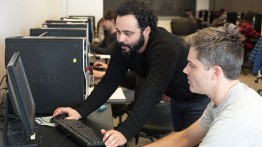Digitial Fabrication First Level Courses

Carlos Meza, at left, and student
All of the first level courses are required to earn the Certificate in Digital Fabrication. (Particpants may be excused from a first level course in favor taking additional advanced level courses if they can demonstrate established knowlege of the material.) Each course can also be taken individualy for Professional Development Hours (PDH) or Learning Units (LU).
3-D Printing: Level 1
This course is designed for makers of all types: architects, engineers, designers, artists, and hobbyists. The focus of the course will be hands-on projects starting with simple extrusions and primitive shapes that are then printed. Students explore modeling slightly more complex objects and develop them into final printing projects. Participants will explore basic design software such as Tinkercad, an easy-to-use 3D CAD design tool. A knowledge of coding is not required. Students should bring their laptops to class.
Brandt Graves, M. Arch, Pratt
9 sessions, 27 PDH/LU
Thursdays, 6:30-9:30 October 15-December 17 (no class Nov. 26)
6:30-9:30 p.m.
Register Here
Digital 3-D Modeling
This course reviews drawing techniques as an introduction to 3-D modeling using Rhinoceros 3-D version 5.0 as the main platform. Some experience with AutoCAD 2-D/3-D is recommended but not required. Computers are provided for each student, but it is recommended that students bring their own laptops for plug-ins and customization.
Carlos Meza, M. Arch, Pratt
9 Sessions, 27 PDH/LU
Thursdays, October 15-December 17 (no class Nov. 26)
6:30-9:30 p.m.
Register Here
Introduction to 3-D Digital Fabrication with laser cutting, plasma cutting and CNC milling
This course gives participants hands-on experience with three technologies of digital fabrication: Laser Cutting, Plasma Cutting and CNC Milling. Some knowledge of digital 3-D design is required. Students should bring their own laptops with 3-D software installed. Students will be responsible for paying for any materials used.
Carlos Meza, M. Arch, Pratt. & Sinisa Janjusevic ,Technician & Machinist, Cooper Union School of Engineering
7 sessions, 35 PDH/LU
Saturdays, October 10-November 21
11 a.m. - 4 p.m.
Register Here




